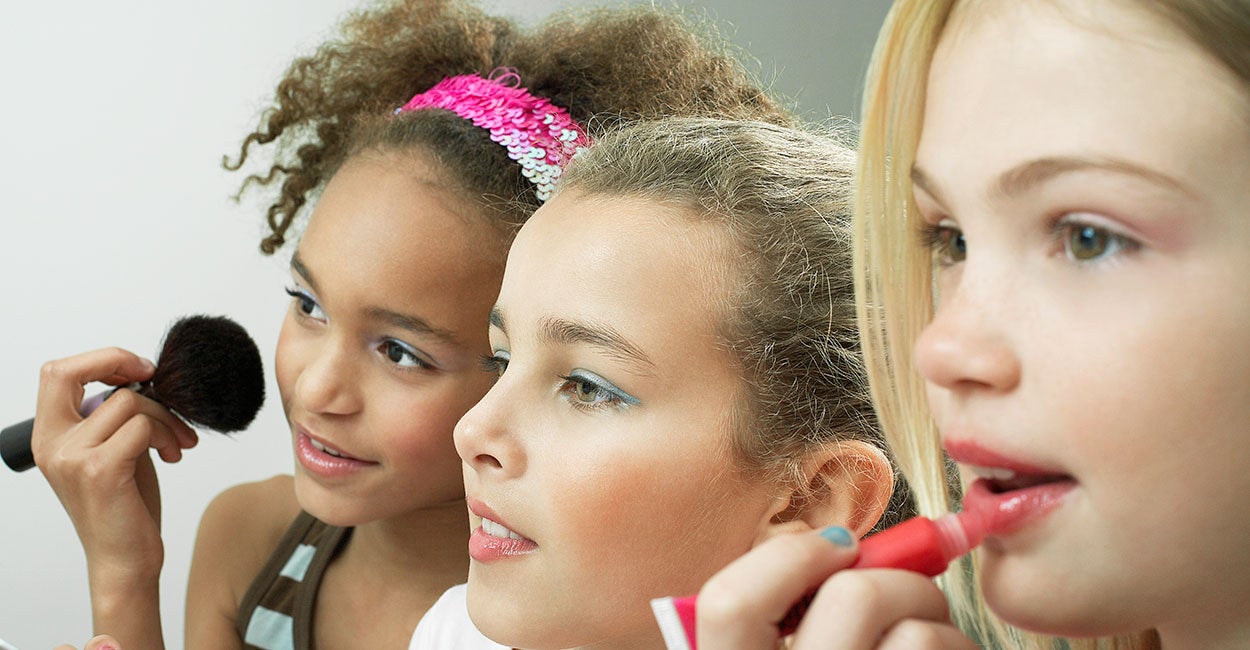Netflix in early September is releasing a French film, “Cuties,” which has been criticized for its hypersexualization of young children. Some of the promotional material for the film likewise has been criticized, for which Netflix has since apologized.
Lila Rose, founder and president of Live Action, a nonprofit opposed to abortion and dedicated to promoting a culture of life, characterizes the film as “the outright promotion of pedophilia” and joins “The Daily Signal Podcast” to discuss it.
The Daily Signal depends on the support of readers like you. Donate now
We also cover these stories:
- The Justice Department deploys about 200 federal agents to Kenosha, Wisconsin, amid the violence and unrest following the police shooting of a black man.
- Former President Barack Obama praises the NBA’s Milwaukee Bucks for boycotting a playoff game against the Orlando Magic on Wednesday night in response to the shooting.
- Another 1 million Americans file for unemployment insurance benefits.
“The Daily Signal Podcast” is available on Ricochet, Apple Podcasts, Pippa, Google Play, and Stitcher. All of our podcasts can be found at DailySignal.com/podcasts. If you like what you hear, please leave a review. You can also leave us a message at 202-608-6205 or write us at letters@dailysignal.com. Enjoy the show!
Rachel del Guidice: I’m joined today on “The Daily Signal Podcast” by Lila Rose. She’s the founder and president of Live Action. Lila, it’s great to have you with us on “The Daily Signal Podcast.”
Lila Rose: Thanks for having me, Rachel.
Del Guidice: Well, it’s great to be with you.
So, Netflix is releasing a new movie called “Cuties,” which originally featured a sexualized poster of young girls and the original description stated, per real news: “Amy, 11, becomes fascinated with the twerking dance crew. Hoping to join them, she starts to explore her own femininity defying her family’s traditions.”
Lila, you’ve been speaking out about this film. What are your thoughts?
Rose: Sure. First of all, it just goes to show Netflix is not really caring about protecting girls or victims of sexual exploitation because when they said this poster was exploitative, but that the actual movie wasn’t, I think that’s just outright lie.
Anybody who watched that trailer, and I did watch this three-minute trailer of the movie, the movie is not released yet through Netflix, but it is clear that the whole film, it’s not just the poster, but the whole film is exploiting young girls. It’s not showing their femininity, it’s sexualizing them.
And many of the images, even in that trailer, I would consider a softcore pornography, encouraging young girls to remove clothing, twerk, act in very sexual ways, hide it from their parents.
This is in an environment today where over 50% of minors online are being approached for sexual favors or being effectively molested online by creeps, by pedophiles, by people out to hurt children. So for Netflix to do this, I think they’re just furthering the exploitation of children, and they’re trying to normalize it, which is incredibly concerning and the reason why there’s so much outrage, and there should be.
Del Guidice: You commented on Twitter that “Cuties” “is the outright promotion of pedophilia.” Can you talk a little bit about more why that’s the case?
Rose: In any time an adult is, or anyone, is engaging with a child in a sexual way, that’s sexual abuse, and there are laws against it, as it should be. This is completely inappropriate, it’s evil, it’s harmful to children.
And an 11-year-old is a child, legally she’s a child, she typically is not even past puberty at that age, she’s prepubescent. And anybody sexualizing her, anybody treating her in a sexual way or taking sexual photos of her or creating a sexual film about her, that is a form of objectification and exploitation.
Pedophilia today, I think it’s being normalized. We’re seeing this, unfortunately, through a lot of the simple things, whether it’s jokes by celebrities about pedophilia, whether it’s an actual movement by some in the LGBTQIA+ movement saying that man-boy relationships should be normalized. There are these pushes in our society.
What this film does is it says that it’s OK for people to get gape at, to look at, to actually approve of, and even promote young girls acting in sexual ways at just 11.
So this is what pedophiles do, they groom their victims to say that they should be acting sexy as children, that they are sexual beings as children and should act out sexually. And pedophiles use that approach in order to get their victims to feel more. They’re trying to get them acclimated so that they can then abuse them.
This whole film is effectively a growing mechanism for young girls to tell them that it’s normal to act out sexually, it’s normal to do sexually suggestive dancing, wear sexually suggestive clothes, and that this is part of growing up. It’s not part of growing up. This is actually part of a culture that objectifies women and young girls, and it needs to stop.
Del Guidice: Netflix did respond to the outrage. They said in a statement to Deadline, “We’re deeply sorry for inappropriate artwork that we used for ‘Cuties,’ it is not OK, nor was it representative of this French film, which premiered at Sundance. We’ve now updated the pictures and promotions.” What is your reaction to what they said?
Rose: They’re lying. Netflix is outright lying to their subscribers and the public here because the poster that created outcry is merely effectively a still image of the images that are in their trailer, and that will be in their film.
If anybody were to watch the trailer, the trailer is even more disturbing than the poster because it still has girls being encouraged to dress suggestively, dance suggestively in a sexual way, hide it from their parents, as some sort of like 11-year-old awakening, when they’re, again, just young girls, they’re not even close to adults yet.
So to say that the poster was wrong, but the actual short film isn’t wrong, the preview isn’t wrong, is preposterous. That trailer is literally more images of the poster and images just like that poster had except worse.
Del Guidice: I know you said, Lila, that you did see the trailer to this film. Is this something that you plan on watching once it’s released?
Rose: Absolutely not. No.
I think it’s clear, I watched the trailer because I thought maybe there’s something we don’t know here, maybe the poster was a mistake of some kind, but the trailer reaffirms that the entire film is what the poster indicated, which is that it’s a sexualization of 11-year-old girls, it’s grooming them to act sexually, to think that that’s normal, and the entire film will just be an extension of that.
I think it would be inappropriate for anyone to watch that film. And it’s certainly unacceptable that they had young actors acting in that way, and it’s unacceptable that they’re putting it on a mass distribution platform through Netflix.
All in all, it is only normalizing the sexualization of children, which is becoming a crisis in this country.
I mentioned earlier that over 50% of young teens have been sexually reached to on the internet. They have been solicited for sex, they’d been solicited for sexual images, they’ve received unwanted advances—often from adults, from pedophiles—on the internet. And this is over 50% of kids today.
We know that this is a mass problem, whether it’s the platform of TikTok or Instagram or Snapchat, that sexual solicitation is happening via the web, that adults are grooming children regularly, attempting to groom children in order to then abuse them.
This is a mass problem. Combine this with the fact that pornography use rates only increase, have increased in the last 10 years dramatically, that the rate of child porn only mushrooms every single year. So this is an epidemic in our country and globally. And for Netflix to be part of the problem is completely inexcusable. They need to pull this film.
Del Guidice: On that note, Lila, in commenting about this film, Dawn Hawkins, the senior vice president and executive director of the National Center on Sexual Exploitation, … said that “Cuties” clearly sexualizes children, and in particular girls of color, the pornography industry is built on these stereotypes. Lila, can you talk a little bit about how this happens?
Rose: I mentioned earlier that over 50% of kids have received solicitation. It’s actually over 50% of kids have seen pornography online. And right now some of the latest stats say 1 in 5 teenagers have received solicitation. So we know that pornography and sexual solicitation is affecting young children.
To show them through a Netflix film that this is normal, it’s normal to act sexually when you’re 11, it’s normal to twerk—twerking, by the way, making sexual suggestive moves, showing body parts—that’s the kind of solicitation a lot of kids are receiving.
So they’re receiving solicitation that says, “Can you send me pics? Or can you do a FaceTime call with me?” Or they’re asking completely inappropriate or making sexual suggestive questions or comments. So this is all part of this, the overarching problem, which is the sexualization of children.
Pedophilia is sexual interest in a child. Acting on pedophilia is sexually exploiting that child. That is what is happening. And these platforms—whether it is TikTok, or it is Instagram, or it’s Snapchat—are allowing a lot of pedophiles on their platforms to make unsolicited, and even if a word is solicited, it would be wrong to basically make advances on children.
Netflix is basically sending the message through their film “Cuties” that this is normal for kids to act sexually, that it should be encouraged, and that it should be hidden from parents, and that’s the way it should be. That’s not the reality.
The reality is children need to be protected. And sex is something that is very beautiful and sacred, but it’s for adults in a loving, lifelong relationship, which should be a marriage, and it’s not for getting children to get involved sexually.
So the larger cultural problem here extends beyond “Cuties,” beyond Netflix, it’s the use of technology. It’s the normalization of this from other political agendas connected to, unfortunately, the LGBTQIA lobby.
And a lot of parents when they find out about it, they’re completely disturbed, and for good reason, because we are entrusted as parents, and I have a young child, we are entrusted as parents to protect our children. And these companies, entertainment companies, and technology platforms are working against parents’ interests and the protection of children.
Del Guidice: Well, it was actually one of my follow-up questions, and you pretty much did answer it, but big picture, Lila, are we doing OK as a culture, letting girls stay girls—obviously, it’s showing us in our face that this is a problem we have—or would you say our culture is pressuring young girls to be sexual when they’re far too young?
Rose: Yeah. Just case and point that our culture is sexualizing young girls, encouraging them to be sexual when they’re far too young.
Women are beautiful, girls are beautiful, human beings are beautiful. We should celebrate the beauty and the goodness of all people, but sexualizing is creating children, or you can be an adult, into an object for the sake of sexual pleasure.
Human beings are not to be made objects for the sake of sexual pleasure, human beings are created for love. Young children are created for love. And sexual pleasure is only appropriate in the context of a marriage where there is love and where there is a willingness to start a family and do all the things that are ordered to the purpose of sex.
Sex is designed for creating new life, it’s designed for intimacy. It’s not designed for abuse, exploitation, or the horrific situation of taking a child and trying to make them responsible for creating sexual pleasure to an adult. It’s evil. And most people know that.
I think most people know that, but in a society that is desensitizing itself by allowing so much pornography … So many young girls are being influenced by role models that are basically fronting their sexuality, using it as a tool to sell things on Instagram, or to get more likes or followers. It all sends the wrong message.
The positive messages: human beings are beautiful, we’re created in the image of God, we are sacred, we are precious. Sex is a beautiful thing, but it’s not created to sell, to use, to abuse. People aren’t created for that, they’re created for love.
Del Guidice: Lila, how would you encourage not only parents, but so many of those who do have Netflix, and so many people have it, to respond to this?
Rose: Netflix does pay attention. They did back down and said the poster was bad. They need to keep hearing from us, whether it’s through social media, it’s contacting Netflix’s customer service bureau. You can also use the power of the purse and say, “I will not subscribe to Netflix anymore, and refuse to continue to be a patron of their services.”
So I would encourage all of these as options, because if we are silent and we just let this go on, they will continue to do it. So I think if you’re a customer or if you’re just a concerned American or parent, making your voice heard publicly, as well as directly, to Netflix is crucial.
Del Guidice: Well, we’re going to get back to sexualization and hypersexualization of women. I want to take one caveat here and talk a little bit about a recent development you tweeted about this week, talking about Planned Parenthood.
You said, “Planned Parenthood staffers admit under oath to committing partial-birth abortions against federal law to [obtain] intact organs. This involves pulling a baby feet first—except the head—and then sticking scissors in—suctioning the brain and crushing her skull.” Can you tell us about what these staffers admitted to and what the situation is here?
Rose: Yeah, so, it’s extremely horrific, but keep in mind, this is happening in our country right now today—late-term abortions and abortions to the number of 2,300 abortions every single day, all on children with beating hearts, and any baby of any age should be protected and not killed.
So these are particularly horrific procedures to learn about because we’re talking about a fully formed infant that is about to be born, and instead it’s turned around, delivered breach. His or her spinal cord is cut or his neck is snipped … by a knife or forceps. And then their brains are suctioned out to collapse the skull and continue to deliver the baby. Absolutely horrific.
This is something that’s being admitted on tape that this is done. We in the pro community know this is happening, we’re working to stop it. Most Americans don’t know it.
But what’s so powerful about this, Rachel, is a current abortionist, Deborah Nucatola, who has worked for Planned Parenthood is admitting on tape in 2014 to Center for Medical Progress investigators, a friend of mine, David Daleiden, that she actually uses this method of partial-birth abortion because she doesn’t want to rip the body apart in utero.
This is absolutely horrific to even consider, but in a late-term abortion, you need to deliver the baby, in any abortion you need to deliver the baby. You want to deliver the baby dead, that’s what the abortionist said. They’re paid to stop the beating heart.
But in this situation they have another motive. They also want to get solvable body parts so that they can then sell them. Planned Parenthood wants to make sure that when the body is removed from the mother, the baby’s body, it’s removed whole so that they’re able to harvest the body parts.
If they abort in the typical way, which would be to rip the baby out piece by piece, with most of the baby still in the mother, they might damage those valuable organs that they want to sell illegally.
And so what the abortionist is admitting on this tape is that she uses what is technically an illegal abortion procedure to deliver the baby breach. So a living, kicking, moving baby, stab the baby in the neck, suction it’s brain so that she can then harvest from that baby’s body usable organs and body parts. Completely heinous.
They later on, the same abortionist, under oath, talked about doing this again. So the case is crystal clear that the abortion industry is doing this, they have been doing this for decades, and that’s one of the reasons that Live Action and other groups are calling on the Department of Justice to take action right now, because there is a clear case, I think, against them.
Federal law says you can’t sell baby body parts. Here, Planned Parenthood is admitting that they actually changed their abortion procedures to get sellable baby body parts. The case is very clear.
So we’re calling on the Department of Justice to step in here to prosecute these atrocities, and to ultimately lead to the conviction of Planned Parenthood, which would stop their taxpayer funding and shutter many of their houses of horror.
Del Guidice: Well, thank you for sharing that. As hard as it is to hear, it’s important to be educated on that. So thanks for sharing that.
Going back to hypersexualization, we talked a lot about “Cuties,” Cardi B just released a new song called “WAP,” and a lot of people have a lot of things to say about it, but what is your perspective on her song as it relates to the hypersexualization of women?
Rose: Yeah, I did not watch the full music video. I saw screenshots, so I think I understand what happened in it, and I read the lyrics. It’s just a shame. It’s a shame that someone with Cardi B’s talent and her potential, that she is writing a song that, in an unabashedly, blatant way, sexualizes and objectifies women.
The whole thing is about our body parts and getting things from men sexually, and graphic depictions of sex. It is a pornographic song, and it doesn’t uplift or elevate women or men or relationships. It brings it down to the lowest denominator and degrades everybody.
So I look forward to the day when we have more people involved in pop music and rap who are respectful of women and respectful of human beings and create beautiful, positive music that talks about all the good things instead of objectifying them.
I do think that those people exist in culture, in the arts right now. I think even just someone like Justin Bieber, and he’s not specifically rap, he’s into some more R&B lately, but even him rapping about his love for his wife or talking about how he saved sex for marriage, and how he wanted to get married to his now wife, and in the process, he wanted to make sure to not have sex with her beforehand because he thinks sex is precious and he respects her.
Those examples do exist in our culture, which is the good news, and I would just hope that Cardi B can maybe hear some of the feedback that this is not OK, and that she can use her many talents to create good and beautiful music.
Del Guidice: Something that has joined the conversation since the release of her song, because it was so popular, and I know there’s an internationally known female comic that I follow that basically said what I’m about to say, and she was saying that Cardi B is essentially courageously joining this crowd of male artists and rappers who have been unabashedly producing sexually explicit songs for decades, and that this was a very courageous thing to do. And I wrote about this.
Something I want to ask you about is since when does empowerment for anyone mean sexualization and basically putting yourself out there as, “Oh, I’m sexual, and this is freeing somehow.” Why is that?
Rose: Well, Rachel, I think you’re spot-on. It shouldn’t be a thing. I think that the idea that there are men out there sexualizing women and objectifying them and being disrespectful, and so therefore, us as women should do the same thing so that we can be just like them—that is lowering the bar and it’s getting in the mud and becoming like the very people that we’re criticizing.
So again, I think that there’s this temptation to just want to be like the worst person out there. If being like a man is to disrespect women and sexualize them, then as a woman, I’m going to go do that. You’re just lowering yourself to their level.
Again, I think Cardi B has such a huge platform, she could do so much good for the world by saying, “I’m not going to be part of that culture, that culture of objectification, that culture of being crass and being disrespectful to women. I’m going to elevate.” And there are people out there trying to do that.
So again, I think your voice is really important. I think anybody’s voice on social media speaking out … because usually sex can sell, which is, again, a bad thing. I think that’s why we have actual sexual trafficking and human trafficking, because sex can sell. But there is an alternate where if people are willing to speak up against it, it does encourage and incentivize artists and creators to say, “Wait a minute, just because sex can sell with some people, it doesn’t mean we should be doing it.”
So I think that the outcry is good to Cardi, and I think the message can be a positive one. Look, you don’t have to get in the mud with other rappers that disrespect women and objectify women, you could be part of the solution and create really empowering, beautiful music.
Del Guidice: Well, Lila, thank you so much for being with us today. A lot of heavy topics, but stuff that we need to talk about. So thank you for being here.
Rose: Thank you. And thanks for writing on this stuff. I think it’s so important, and your voice is really powerful. So thanks for having me.






























